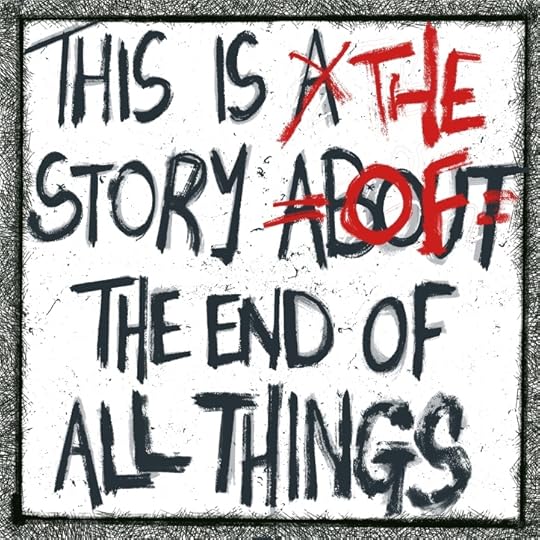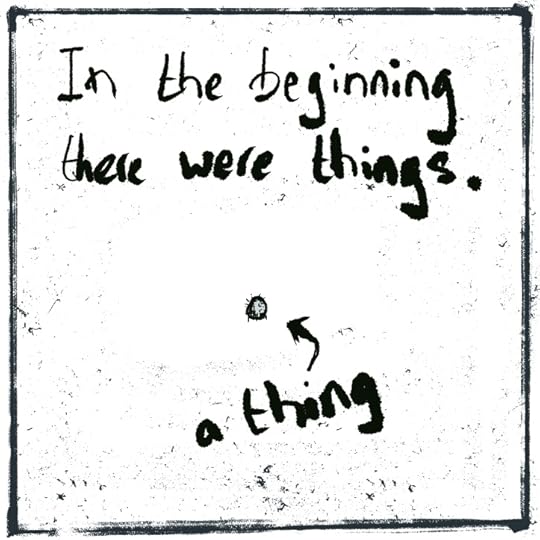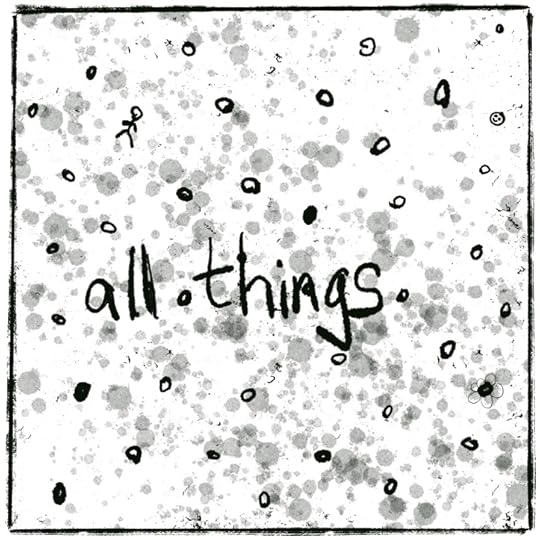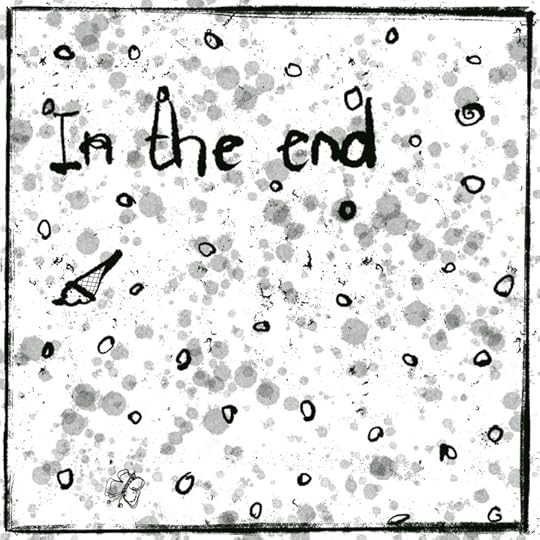Chris Page's Blog
October 5, 2025
Nature Park







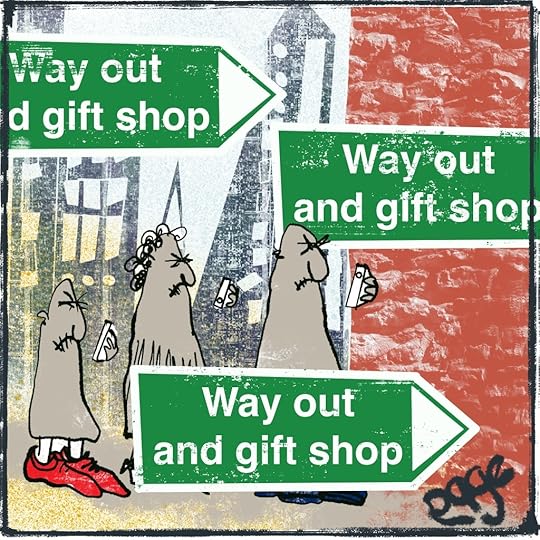
 Nature Park
Nature ParkA cartoon thing. An update of a thing I did in 1989. The original is the last photo, after the cartoon panels.
The update is Procreate, the original is self-evidently ink and crayon, tea, coffee, beer, and cigarettes.
The Gospel According to Mr Eric
Evan Findlay Hay, long-time droog, scholar, occasional acrobat around (or, ahem, dangling above) a pool table, and all-round dangerous mind, has put out a mini book The Gospel According to Eric — published by Overground Underground.
According to the publisher’s site, ‘The Gospel According to Mr. Eric testifies the making of histories and myths, both split and spilt across borders of genre and social strata. Yes, something something against totalising narratives something something but also: How do identities congregate around a cause in the first place? What are the textual mechanisms by which this occurs?’ — and who am I to argue with something something like that?
It’s also quite bonkers and very funny.
But don’t take my word for it when you can take Evan’s word for it: “A Conversation with Evan Findlay Hay” right here: https://overgroundunderground.co.uk/blog/f/a-conversation-with-evan-findlay-hay
Available from https://overgroundunderground.co.uk/books
Read it, or forever suffer the pain of wondering what life-changing and ineffable TROOFS are embedded in the Ericolian screed.
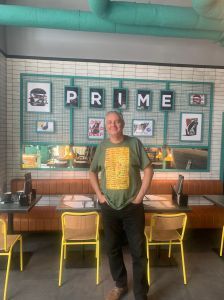 The author himself. T-shirt by FictionalShirts/Psipook psipook.redbubble.com
The author himself. T-shirt by FictionalShirts/Psipook psipook.redbubble.com
July 31, 2025
Spoti-bollocks
The alert reader (hi!) will have seen that I posted that I cancelled my Spotify subscription recently.
Here’s a tiny but exciting update bringing you the full story of Chris Page’s wire-fight conflict with Spotty’s CEO.
Spotify’s business practices, ie, ripping the living financial heart out of everyone that does business with them and eating their entrails, have attracted a little controversy over the years, every year, all the time. Some artists like Joni Mitchel and Neil Young have withheld their music from the platform from time to time, and more are withdrawing now.
Recently, the co-founder of Spotify, Daniel Ek, invested (through another of his companies) €600m in military battlefield AI made by Helsing (in addition to an initial €100m two years ago).
Oxymoronic military intelligence fused with moronic artificial intelligence? Feel the collective shudder.
The Israeli military since the beginning of the genocide has been using AI that is functionally similar to Helsing’s to analyse intel and draw up lists of targets. Obviously, that has worked out well, ensuring no innocent people were killed or maimed or burned alive in hospitals along the way.
Apart from the ethics of any kind of armaments, you now have robots drawing up lists of people to kill, where to find them, and how to kill them. When a self-driving Tesla can barely make it down the street without mowing down an old lady or bursting into flames, how do we feel about AI driving a battle? We moral philosophers have a two-word expression for that.
Digression: we note the irony in worrying that battlefield robots will have no compunction about killing innocents, while it’s obvious that most humans on the battlefield already have no compunction about killing innocents. End of digression.
The money that Ek invested in this AI killer tech is derived in part from his profits and stock in Spotify. So my monthly subscription was — even if only a tiny part of that sub — going to the makers of killer apps.
And look at the amount of money Ek has invested — in destruction. If socially applied what could that do? I am reminded of that other tech head, Musk, who declared publicly that if someone could show him how to end world poverty with his wealth, he’d do it, until the UN gave him a plan and he became distracted in a pot of ketamine and forgot all about his challenge.
The news of Ek’s investment has prompted yet more artists to leave Spotify — Deerhoof leading the stampede (see what I did there?) Quite a few users are leaving too, if online comments are anything to go by and a number of friends are doing or have done the same. Good for them! Good for us all!
So, curious, I searched to see if there was any data on just how many users have left the platform. Given Spotify’s spotty record (see what two things I did there?) users must be leaving in their droves and Ek must be on his pleading knees by now.
No, they aren’t and no he bloody well isn’t. In the last quarter the number of new subscribers has actually increased.
Increased! Paying subscribers were up 12% from 276m from 268m at the end of March, and monthly active users were sup 11% to 696m from 678m. But surely Ek noticed I cancelled last Sunday! Down! On! Your knees!
I have no idea where to go from here. Ek has given howevermuchmoney to make horrendous new killing software, and the potential targets of that killing software are rushing to give him yet more money.
A good friend recently marvelled how little response he got from any social media or Substack post he makes about substantial subjects — say, G a z a — but a photo of morning cappuccino with a smily face in the froth will have people beating on the like button as if the coffee had just won the Nobel Prize for being a cup of coffee.
It will be interesting to see whether Spotify’s third-quarter reports show any rise or fall in users. Or it might not. It might be utterly slam-my-head in the closet door demoralising.
Well, there are my spotty, ranty bollocks. I leave them there for you to do with as you will. But the soundtrack will not be brought to you by Grinding-War-Machine-ify.

July 16, 2025
Japan First, at last!
The rise of pop nationalism in the land of wa
Word of the day, mot du jour, kyō no ryūkōgo (今日の流行語), would appear to be 日本人ファースト. This past week, the phrase has been buzzing in the media — mainstream and social — with all the subtlety and charm of the seasonal cicada on hormonal overload as Japan heads into its July upper-house elections. As the term has been trending on X-Twitter, non-Japanese friends have been posting their alarm on Facebook.
日本人ファースト— Nihonjin First, or, to render it with its full cultural friction intact, Japanese People First, is a dully clichéd nationalist appeal: prioritise the welfare of Japanese citizens, defend national identity, and resist the perceived encroachment of foreign influence. The kind of slogan that arrives with depressing predictability alongside increasing demographic anxiety and economic uncertainty. And the form and origins of the phrase 日本人ファースト tell a similarly dispiriting story.
The slogan combines Japanese and English: 日本人 (Nihonjin) for ‘Japanese people’ and ファースト, the English word ‘first’, rendered in katakana — the script used for foreign loanwords. So we get a rallying cry for national identity expressed partly in imported phonetics. Loanwords are not unusual in Japanese, where these katakana terms are ubiquitous — but in this context, the irony is hard to ignore: a slogan about defending Japanese purity framed using foreign vocabulary. It’s a bit like putting tomato ketchup on sushi.
That irony deepens when we trace the origin of the slogan itself. ‘[My Country] First’ rhetoric is not native to Japan. It follows a lineage that begins with America First, which emerged in US political discourse in the early 20th century. Most famously, it was the name of a prominent isolationist movement during the 1940s, associated with figures like Charles Lindbergh, and more recently revived by Donald Trump as a (mis)guiding principle of his presidency. In Britain, Britain First was used by fascist leader Oswald Mosley in the 1930s and is now the name of a far-right, anti-Muslim political group.
Now, in 2025, Japan’s nationalist fringe is adopting the same slogan format. It’s being used most prominently by Sanseitō (参政党), a relatively new party with a growing following. Sanseitō combines hardline nationalism, anti-globalist rhetoric, and an emphasis on traditional Japanese values. Their platform includes opposition to foreign land ownership, reductions in immigration, and calls to restore Japan’s cultural and political autonomy.
Sanseitō has positioned itself as a populist alternative to Japan’s mainstream parties, often using social media and YouTube to reach voters disillusioned with the political establishment. Their 日本人ファースト slogan is being used to frame policy proposals focused on protecting pensions, improving food security, and shielding Japan’s domestic economy from external pressures. The messaging is clear: Japan must look inward, shuck off pernicious foreign influences, and reclaim its purity to survive.
Or become GREAT again.
While nationalist sentiment has always been part of Japan’s political DNA, what we are seeing now is something more virulent: a well-adapted mind-virus, long incubated on the margins, now finding a new host in younger generations. This isn’t your grandfather’s post-war conservatism. It’s nationalism in a new costume for a new audience — tech-savvy, meme-literate, historically clueless, and politically illiterate.
The language may be Japanese, but the attitude is globally synchronised.
This development is not unique to Japan. The slogan fits within a broader international trend — a surge in right-wing populism that prioritises national identity, turns immigration and diversity into political weapons, and rejects global institutions. In the United States, this trend is shaped by figures like Steve Bannon, who has worked to foster international ties between far-right movements. In the UK, Reform UK, formerly led by Nigel Farage, campaigns on an anti-immigration, anti-net-zero platform. In Germany, the AfD (Alternative für Deutschland) has grown in strength on a similar message. In France, Marine Le Pen’s National Rally continues to position itself as defender of the French people against the ‘globalist elite’. Italy, Hungary, Poland, India — each has its own version of this narrative.
Japan has, until recently, been something of an outlier. While ultranationalist groups have always existed on the margins, the political mainstream largely avoided adopting this kind of populist language. Even now, mainstream parties like the LDP tend to couch nationalist policies in more technocratic or paternalistic terms. But the conditions that have fuelled far-right movements elsewhere — stagnant wages, narrowing life chances, the nagging sense that the powers that be regard you as a goggle-eyed minion — exist here too. It may have taken longer, but the arrival of overt ‘First’ language in Japanese politics is no surprise.
There’s also an irony in how this kind of nationalism is developing in a country that already has strong anti-immigration policies, a deeply embedded monocultural identity, and where the foreign population remains small by international standards. Japan does not need to close the gates — it never really opened them.
This tension between surface-level harmony and underlying exclusion has had national exposure before, as the corpse in the cupboard sheds its head with an audible thump: in 2015, Ayako Sono, a conservative columnist and novelist, used her Sankei Shimbun column to argue that foreign residents in Japan should be housed in racially segregated zones — explicitly endorsing an apartheid-style arrangement. The Sankei put this on the front page. The fact that such views were given prominent space in a mainstream national newspaper speaks volumes about the kinds of ideas that remain within the bounds of public discourse.
This may also be a reflection of Japan’s internal contradictions. The country places a high value on wa (和) — social harmony — and prides itself on politeness and cohesion. But this can also mask more exclusionary tendencies. Foreign residents often face discrimination in housing, employment, and legal protections. It’s only in recent years that people started sitting next to non-Japanese on public transport. Rhetoric like Nihonjin First brings those tendencies to the surface. It gives them a slogan.
And perhaps the final irony is this: for a country so invested in its own cultural uniqueness, the most prominent new nationalist slogan is borrowed almost entirely from abroad. It has been translated, transliterated, and rebranded — but its DNA remains foreign.
It’s an irony as succulent as fine sushi: Japan’s emboldened nationalism isn’t just couched in imported terms — it’s part of, and enabled by, a global trend. The rhetoric may arrive dressed in katakana, but the DNA belongs to an international mind-virus.
And while it’s tempting to dismiss Sanseitō as a fringe party with limited reach, we’ve seen this story before. 日本人ファースト might be last to the international ‘Us First’ party — but it’s rubbing double chins with Farage and Bannon at the bar.
June 25, 2025
The is the story of the end of all things
June 24, 2025
Eat yourself happier (no added sugar)
The connection between food and mood seems as intuitive as that between food and health. But is a chocolate treat really the best way to cheer yourself up?
It is simple. You feel a bit down in the dumps — a bit jaded by work, or life with your partner, or living in a foreign country — so you indulge yourself with a tub of ice cream, a hamburger, or a bar of chocolate. You feel better for a while.
Some individuals with persistent frustrations will soon be back at the comfort food, and they might not realise that their mood-enhancing food is actually exacerbating the problem.
Comfort food is often rich, high in carbs and sugar. It is probably processed — it probably burns too fast and lacks many of the right proteins and fats that act as natural and sustainable mood (and energy) stabilisers.
For a graphic illustration, witness the effect of Morgan Spurlock’s exclusive McDonald’s diet. In the documentary Super Size Me, he changes in less than a month from bright young thing to hyper-animated zombie. He is listless between meals and apparently stoned after them.
Then there is the tale of Appleton, Wisconsin High School in the US. The school was a basket case of behavioural problems, weapons, academic non-achievement, violence, and suicides. In 1997, fast food and sugary drinks were banned from the school and replaced by natural, unprocessed food — a natural source of some of those positive mood foods. The school went quickly from behavioural sink to a model institution where incidences of the violent, self-destructive, and anti-social kind sank to near zero. What’s more, academic performance rocketed.
So how does this work? A lot of our preferred fun foods have a high glycaemic index (GI), which means they release their energy quickly. After eating, we are swamped with energy and temporary mood enhancers like caffeine and sugar. The body burns up the energy too quickly and we crash. The more high-GI food we consume, the more we appreciate the rush, the more often we go looking for it — and the more often we mistake it for real benefit. White bread and sugar additives are common culprits.
Good mood foods manage your feelings by balancing energy and nutrition — but also, crucially, by managing serotonin levels.
Serotonin is the natural feel-good chemical that the brain produces and is manufactured from the protein tryptophan. It follows that eating foods high in tryptophan will help sustain and enhance positive moods. Lean white meat, bananas, eggs, nuts, wheat germ, avocados, milk, cheese, and beans are good.
Once we are producing serotonin healthily, the body needs to be able to make the most of it. The brain is at least 60 percent fat, which is why some people on low-fat diets suffer depression. However, you can feed your brain without bloating yourself. Omega-3 and omega-6 fats are found in fish, nuts, and seeds, and regular consumption of these has been found to reduce anxiety and depression — and lighten the moods of people who do not suffer these conditions.
The good news here is that a diet that is properly balanced in serotonin and low- or moderate-GI energy sources will likely reduce the impulse to binge on the things that are less good for us. For example, chocolate addicts who take in extra serotonin find that they lose much of their craving.
So what does the ultimate mood-enhancing meal look like? The Food and Mood Project, affiliated with Mind, the mental health charity, recommends non-wheat pasta tossed with tuna and pesto, an avocado salad with walnuts and seeds, and fruit and oatcake for dessert.
Eating for mood is now taken seriously as an alternative to medication for people with serious anxiety, depression, food addiction, or stress — and increasingly, people who suffer none of these problems are incorporating mood foods in their diets as a way to just get more out of the day.
http://www.glycaemicindex.com/
This article first appeared in Kansai Scene in 2005. I just found it in a digital box in the back of the cyber-fridge and decided to put it out on the online table for everyone partake. And, yes, that metaphor was tortured to the point of screaming.
April 14, 2025
Liberation day: my unilateral declaration of independence was no walk in the park
Yesterday was an interesting day. Got up, resigned my job of 34 years, went for a mental health/decompression walk, got lost in a primeval forest, ended up blundering around in the rain and the dark wondering whether I would see my cats again.
It has been a long time coming, this resignation. My day job over the years has paid my way and corroded my soul to unrecognisable rust-bones sinking in toxic sludge, under fume-belching machines on a hill of cracked skulls. I am not going to share in this space the mental debilitation that company brought me to, but it was, well, real and alarming. I was, on a monthly basis, exchanging mental health for a pay cheque. As many of us do.
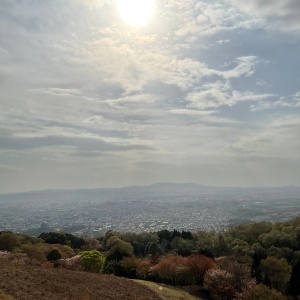 A bright future if I survive
A bright future if I surviveThere certainly was no future there, and dismally, there never had been. It was an employment made of necessity, where on the best of days the employees are herded like hapless minions to make profits for the implacably incapable owners. HQ is a grey monument to Dunning-Kruger syndrome.
I’m not saying the environment at HQ was toxic, but the sign on the door read: “Abandon Soap, All Ye Who Enter Here.”
This spring, certain threads came together that allowed me to think of getting out on my terms in my own time, so I balled up my little hands and screwed up my eyes, and screamed and jumped.
So that was yesterday morning. This was a huge thing for me. Thirty-four years of That Place, and now striking out on my own for an entirely different life.
I had Liberation Day all planned out. I send the letter, do the bureaucracy, then head out to one of my favourite spots for a mental health walk and to start the decompression process. Nara park, and especially a walk in Kasugayama Primeval Forest, ending up — and this is crucial — at Sarusawa pond under the pagoda of Kofukuji with beer and kebab by the water. This is where I feel serene (despite the place being swamped with tourists).
I made it to the top of mount Wakakusa with its expansive views of Nara and the nearby hills. I was full of oxygen and anticipation from the walk. Caspar David Friedrich’s painting Wanderer above a Sea of Fog came to mind. That was me!
A perfect day!
Until I took a wrong turn in the forest.
I would like to stress to readers who do not know Kasugayama forest how difficult it is to take a wrong turn. The place is managed and maintained, the trails are almost roads, there are signposts and you are on the edge of an actual city. But I managed it.
 There are monsters in the forest
There are monsters in the forestI marched on with great confidence feeling the moment, feeling the metaphor for my new life.
Until I realised that I had been walking an awful long time, we were running out of afternoon, but not running out of road.
Things started to happen. It clouded over — rain was imminent. There was no cellphone signal. No coverage. Which meant no Google Map or whatever. Not that Google Maps is ever useful on the trails in Japan. The app usually just shows you as a glowing blue blob in a sea of undifferentiated green. In addition, Google Maps had me spinning slowly on my own thumb. This was counterintuitive: I knew where my thumb was, and judging from the single path, which clearly knew where it was going even if I didn’t, I wasn’t rotating. But the app is always right, right? Even when there is no signal, which ought to have been a giveaway. So I doubled back. And then doubled forward again. I doubled and dithered and fretted.
It was dark. It was raining. Had I inadvertently strayed into North Korea? The beer at Sarusawa seemed a long way away.
 Jizo shrine to lost children, Kasaguyama forest, Nara
Jizo shrine to lost children, Kasaguyama forest, NaraI came across a lonely and affecting jizo shrine, a memorial to children that have passed away, but which may as well have been a shrine to the pathetic fallen traveller.
Things crashed about in the underbrush. Probably just deer, but could have been tengu or frumious bandersnatches.
The reader who is alert to metaphors, or even augurs — and is there any other kind of reader? — will have seen by now where this is going.
Yes, I have set off with purpose and confidence on a new journey in life, sure of where I was going, looking forward to the adventures on the way, only to have become lost, disoriented and soaking wet while Mrs Page asked me by text whether she ought to call the police to come and find me.
Well, I didn’t die, I wasn’t eaten, I didn’t end up living in a cave like the wild man of the forest for twenty years. I eventually found my way out of the woods and all the way to Sarusawa pond, where, despite the tipping rain, I did in fact quaff a bit of beer under my umbrella.
Now, metaphor people, how does that defiant beer in the rain change the narrative? Was it resolution in the face of adversity or the petulance of an alcoholic whose parade has just been well and truly pissed on?
Tune in next post to find out!
This story is also on Substack, where you can see more words by Chris Page.
If you have enjoyed this story please consider sharing.
March 11, 2025
Escaping the Rats on the Back of Substack
Did I mention that I have set up a Substack? Next, I need to collect subscribers. No, these are not paying subscribers. Subscribing is as free as the wind or a Berkeley hippie.
If you are interested, you can find me at psipook.substack.com, and please don’t feel shy about sharing that address with strangers you meet in the public bathhouse or strange dogs you come across in the park.
I am having my annual spring crisis (distinct from my annual summer, autumn, and winter crises) as, in the day job, we are issued our schedules for the upcoming academic year, informed of our annual negative pay raise, and shown the blackthorn switch that will lacerate our souls. The schedule I have received for next year, in addition to the usual inert sacks of desiccated innards, includes actual vermin. Yes, THEY call it teaching, but I call it being buckled into a chair and having a cage full of rats strapped to my head. In classroom 101.
I am in a froth of fear and loathing.
Did I mention that I have an appalling day job? It’s appalling. It pays my way and corrodes my soul. Such a pit of futility, facile nonsense, and incompetence is not normally to be found outside Dante. Thirty-five years I have endured this corruption of life, marooned on this desolate pile. And now, with vermin eating my face.
I am attempting to take action to create an alternative, independent income. To get the actual fuck out of here.
To this end, I consulted an AI (no, really!). The AI has suggested a four-pronged plan to escape, one prong of which is, quite improbably, Substack. Who am I to argue with an advanced intelligence that will one day take over the world? So, SS—digital Schutzstaffel?—it is.
One thing the AI has not mentioned is the fact, universally known, that THERE IS NO ESCAPE. Prisoners found trying to escape will be caught and forced to listen to *Hotel California* for the rest of their short and miserable lives. While rats feast on their eyes.
We are not free men/things. We ARE numbers. And the bot knows this. Its insistence that escape is possible, and the convoluted escape maps that I have metaphorically tattooed on my skin, are just an elaborate hoax to assert control over me/us: build up hope and then smash it in front of our eyes while I/we flail helplessly in our own tears and viscera.
So that’s what I’m up to. How about you?
Chris Page, Nara, March 2025
February 4, 2025
If you are innocent, you have everything to fear
I spy with my little eye something beginning with you.
I was sitting in the bath the other night when I was startled to see a periscope rise out of the water at my feet. A glassy eye in the lens fixed on me as I clutched my flannel, desperate to preserve some dignity.
‘Do not be alarmed,’ said the periscope.
‘Why not?’ I asked. ‘You’re in my bath.’
‘Just routine government surveillance,’ the periscope assured me. ‘We do it to everyone. If you’re innocent, you’ve nothing to fear.’
Having nothing to fear was clearly not the point. My bath time with my rubber duck was being surveilled! If we knew spy agencies were dropping in on us mid-soak, we’d instantly see it as a grotesque invasion of privacy. But when they watch us online—tracking our browsing, monitoring emails, recording video calls, and even hijacking webcams—many of us shrug it off or live in denial.
The truth is chilling: the NSA and GCHQ have built a surveillance infrastructure capable of hoovering up vast quantities of our personal lives. From phone records to internet activity, these agencies can monitor almost every facet of our existence, often with the cooperation of tech giants like Google, Apple, and Facebook. Programs like the NSA’s PRISM and GCHQ’s TEMPORA, revealed by Edward Snowden in 2013, illustrate how they have direct access to servers and encryption keys. This isn’t hyperbole; it’s documented fact.
A periscope in every roomThe metaphorical periscope isn’t far from reality. Spy agencies can and have hacked webcams to spy on individuals. Documents from the Snowden leaks revealed that GCHQ ran a program called OPTIC NERVE, capturing still images from Yahoo webcam chats—often without users’ knowledge. Between 2008 and 2010 alone, they collected images from millions of accounts, some inadvertently containing explicit content.
Such capabilities are the stuff of dystopian literature, yet they exist in supposedly democratic nations committed to privacy. Imagine what a true dictatorship could do with this technology.
A history of invasive surveillanceState surveillance is as old as states themselves. From ancient Chinese informant networks to Elizabethan England’s use of spies to root out Catholic dissenters, the idea of monitoring the populace has always been intertwined with power.
In the modern era, programs like COINTELPRO in the US and MI5’s surveillance of peace groups in Britain highlight how surveillance often extends beyond protecting national security. COINTELPRO (1956–1971) targeted civil rights leaders like Martin Luther King Jr., attempting to discredit them through blackmail and intimidation. Similarly, MI5’s campaigns against groups like the Campaign for Nuclear Disarmament (CND) included burglary and infiltration.
If you’re innocent, they say, you have nothing to fear. But history suggests otherwise.
Surveillance is controlThe true purpose of mass surveillance isn’t just about catching criminals or thwarting terrorist plots—though these are the justifications often cited. It’s also about control: maintaining the power dynamics of the state and its corporate sponsors.
Take Britain’s undercover police scandal. For years, officers infiltrated environmental and animal rights groups, sometimes entering relationships and even fathering children with activists under false identities. These were not violent extremists but innocent people campaigning for change. Some officers acted as provocateurs, inciting actions that led to arrests or further discrediting the groups.
There are allegations that one officer undercover in the Animal Liberation Front went so far as to plant a bomb in a department store. Another officer contributed to the infamous anti-McDonald’s leaflet that triggered the McLibel trial—the longest and most expensive libel case in British history.
Even families seeking justice for victims of police misconduct, like the Stephen Lawrence family, were subjected to surveillance. Their ‘crime’? Demanding accountability.
Innocence is no defenceThe mantra ‘If you are innocent, you have nothing to fear’ is a convenient fiction. Surveillance often targets not the guilty but the inconvenient. Consider:
– David Miranda, the partner of journalist Glenn Greenwald (who broke the Snowden story), was detained at Heathrow under anti-terrorism laws. His real crime? Being connected to someone who exposed state secrets.
– The Guardian newspaper itself faced direct intimidation, with agents physically destroying hard drives in their offices to prevent further reporting on the Snowden files.
– Secrecy laws gag tech companies from informing users when their data is being accessed. In 2013, Lavabit, an encrypted email service used by Snowden, shut down rather than comply with demands it deemed invasive.
The message is clear: innocence offers no protection when surveillance becomes a tool for silencing dissent.
When privacy is commodifiedState surveillance isn’t the only threat to our privacy. Corporate online tracking has turned our digital lives into a goldmine. Social media platforms, search engines, and advertisers collect vast troves of personal data, often with our tacit consent via inscrutable terms of service. This data powers targeted advertising but also feeds into government databases through partnerships or coercion.
Companies like Clearview AI, which scrapes billions of photos from social media to build facial recognition systems, show how corporate practices can blur into surveillance. With such tools in private hands, the line between state and corporate intrusion grows ever thinner.
The (surveillance) creepMass surveillance systems are rarely static. Once established, they inevitably expand. Today, governments justify these programs as necessary to combat terrorism. Tomorrow, they could be used to stifle protest, silence dissent, or consolidate power.
The Snowden revelations barely scratched the surface of what’s possible. As artificial intelligence advances, so does the ability to analyse vast amounts of data in real time. Imagine a future where every text, call, and movement is flagged, judged, and stored. Innocence won’t matter. Suspicion will.
Bath time for everyone!Surveillance is not just an issue of security; it’s about human dignity. Whether it’s a periscope in the bath or a webcam in the bedroom, the idea of being watched corrodes the basic trust we rely on to live freely.
The claim that ‘If you are innocent, you have nothing to fear’ rings hollow. It is a platitude wielded to justify the unjustifiable. Surveillance isn’t just about catching criminals; it’s about power. And power, unchecked, always turns inward.
So, clutch your flannel and keep your rubber duck close. Because in a world where surveillance is omnipresent, our innocence is irrelevant.
PostscriptThis article was first drafted in 2013 and redrafted in 2024. At the time of posting in February of 2025, Meta and Amazon, two of the biggest collectors of private data, have aligned with the authoritarian Trump-Musk regime. The regime is in the process of seizing control of TikTok in the US, another huge source of personal data, and has taken control of the Treasury payment system, giving access to the financial data on every citizen of the US. Trump is purging the FBI and re-making it in his image. And of course, Trump and Musk now have control over all US intelligence agencies and the apparatus of surveillance and control.
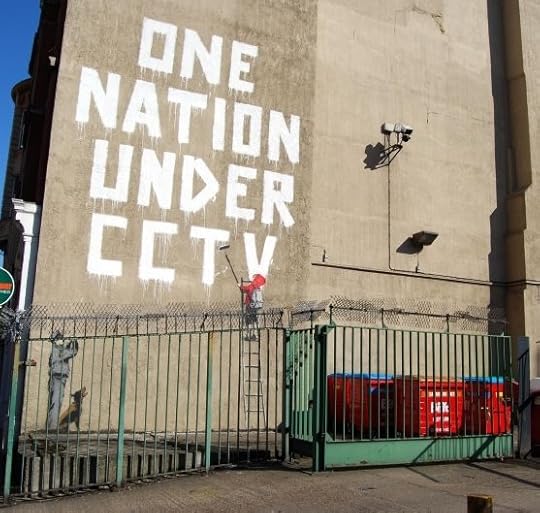 Sources
Sources 1. ‘Optic Nerve: millions of Yahoo webcam images intercepted by GCHQ’ – *The Guardian*, 2014.
2. ‘Inside TAO: Documents Reveal Top NSA Hacking Unit’ – *Der Spiegel*, 2013.
3. ‘The Police Spies Who Fathered Children With Activists’ – *The Guardian*, 2015.
4. Snowden Leaks Compilation – *Electronic Frontier Foundation*.
5. ‘The Secretive World of Corporate Surveillance’ – *EFF*.
If You Are Innocent, You Have Everything to Fear
I spy with my little eye something beginning with you.
I was sitting in the bath the other night when I was startled to see a periscope rise out of the water at my feet. A glassy eye in the lens fixed on me as I clutched my flannel, desperate to preserve some dignity.
‘Do not be alarmed,’ said the periscope.
‘Why not?’ I asked. ‘You’re in my bath.’
‘Just routine government surveillance,’ the periscope assured me. ‘We do it to everyone. If you’re innocent, you’ve nothing to fear.’
Having nothing to fear was clearly not the point. My bath time with my rubber duck was being surveilled! If we knew spy agencies were dropping in on us mid-soak, we’d instantly see it as a grotesque invasion of privacy. But when they watch us online—tracking our browsing, monitoring emails, recording video calls, and even hijacking webcams—many of us shrug it off or live in denial.
The truth is chilling: the NSA and GCHQ have built a surveillance infrastructure capable of hoovering up vast quantities of our personal lives. From phone records to internet activity, these agencies can monitor almost every facet of our existence, often with the cooperation of tech giants like Google, Apple, and Facebook. Programs like the NSA’s PRISM and GCHQ’s TEMPORA, revealed by Edward Snowden in 2013, illustrate how they have direct access to servers and encryption keys. This isn’t hyperbole; it’s documented fact.
A periscope in every roomThe metaphorical periscope isn’t far from reality. Spy agencies can and have hacked webcams to spy on individuals. Documents from the Snowden leaks revealed that GCHQ ran a program called OPTIC NERVE, capturing still images from Yahoo webcam chats—often without users’ knowledge. Between 2008 and 2010 alone, they collected images from millions of accounts, some inadvertently containing explicit content.
Such capabilities are the stuff of dystopian literature, yet they exist in supposedly democratic nations committed to privacy. Imagine what a true dictatorship could do with this technology.
A history of invasive surveillanceState surveillance is as old as states themselves. From ancient Chinese informant networks to Elizabethan England’s use of spies to root out Catholic dissenters, the idea of monitoring the populace has always been intertwined with power.
In the modern era, programs like COINTELPRO in the US and MI5’s surveillance of peace groups in Britain highlight how surveillance often extends beyond protecting national security. COINTELPRO (1956–1971) targeted civil rights leaders like Martin Luther King Jr., attempting to discredit them through blackmail and intimidation. Similarly, MI5’s campaigns against groups like the Campaign for Nuclear Disarmament (CND) included burglary and infiltration.
If you’re innocent, they say, you have nothing to fear. But history suggests otherwise.
Surveillance is controlThe true purpose of mass surveillance isn’t just about catching criminals or thwarting terrorist plots—though these are the justifications often cited. It’s also about control: maintaining the power dynamics of the state and its corporate sponsors.
Take Britain’s undercover police scandal. For years, officers infiltrated environmental and animal rights groups, sometimes entering relationships and even fathering children with activists under false identities. These were not violent extremists but innocent people campaigning for change. Some officers acted as provocateurs, inciting actions that led to arrests or further discrediting the groups.
There are allegations that one officer undercover in the Animal Liberation Front went so far as to plant a bomb in a department store. Another officer contributed to the infamous anti-McDonald’s leaflet that triggered the McLibel trial—the longest and most expensive libel case in British history.
Even families seeking justice for victims of police misconduct, like the Stephen Lawrence family, were subjected to surveillance. Their ‘crime’? Demanding accountability.
Innocence is no defenceThe mantra ‘If you are innocent, you have nothing to fear’ is a convenient fiction. Surveillance often targets not the guilty but the inconvenient. Consider:
– David Miranda, the partner of journalist Glenn Greenwald (who broke the Snowden story), was detained at Heathrow under anti-terrorism laws. His real crime? Being connected to someone who exposed state secrets.
– The Guardian newspaper itself faced direct intimidation, with agents physically destroying hard drives in their offices to prevent further reporting on the Snowden files.
– Secrecy laws gag tech companies from informing users when their data is being accessed. In 2013, Lavabit, an encrypted email service used by Snowden, shut down rather than comply with demands it deemed invasive.
The message is clear: innocence offers no protection when surveillance becomes a tool for silencing dissent.
When privacy is commodifiedState surveillance isn’t the only threat to our privacy. Corporate online tracking has turned our digital lives into a goldmine. Social media platforms, search engines, and advertisers collect vast troves of personal data, often with our tacit consent via inscrutable terms of service. This data powers targeted advertising but also feeds into government databases through partnerships or coercion.
Companies like Clearview AI, which scrapes billions of photos from social media to build facial recognition systems, show how corporate practices can blur into surveillance. With such tools in private hands, the line between state and corporate intrusion grows ever thinner.
The (surveillance) creepMass surveillance systems are rarely static. Once established, they inevitably expand. Today, governments justify these programs as necessary to combat terrorism. Tomorrow, they could be used to stifle protest, silence dissent, or consolidate power.
The Snowden revelations barely scratched the surface of what’s possible. As artificial intelligence advances, so does the ability to analyse vast amounts of data in real time. Imagine a future where every text, call, and movement is flagged, judged, and stored. Innocence won’t matter. Suspicion will.
Bath time for everyone!Surveillance is not just an issue of security; it’s about human dignity. Whether it’s a periscope in the bath or a webcam in the bedroom, the idea of being watched corrodes the basic trust we rely on to live freely.
The claim that ‘If you are innocent, you have nothing to fear’ rings hollow. It is a platitude wielded to justify the unjustifiable. Surveillance isn’t just about catching criminals; it’s about power. And power, unchecked, always turns inward.
So, clutch your flannel and keep your rubber duck close. Because in a world where surveillance is omnipresent, our innocence is irrelevant.
PostscriptThis article was first drafted in YEAR and redrafted in 2024. At the time of posting in February of 2025, Meta and Amazon, two of the biggest collectors of private data, have aligned with the authoritarian Trump-Musk regime. The regime is in the process of seizing control of TikTok in the US, another huge source of personal data, and has taken control of the Treasury payment system, giving access to the financial data on every citizen of the US. Trump is purging the FBI and re-making it in his image. And of course, Trump and Musk now have control over all US intelligence agencies and the apparatus of surveillance and control.
 Sources
Sources 1. ‘Optic Nerve: millions of Yahoo webcam images intercepted by GCHQ’ – *The Guardian*, 2014.
2. ‘Inside TAO: Documents Reveal Top NSA Hacking Unit’ – *Der Spiegel*, 2013.
3. ‘The Police Spies Who Fathered Children With Activists’ – *The Guardian*, 2015.
4. Snowden Leaks Compilation – *Electronic Frontier Foundation*.
5. ‘The Secretive World of Corporate Surveillance’ – *EFF*.

